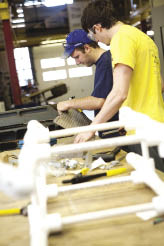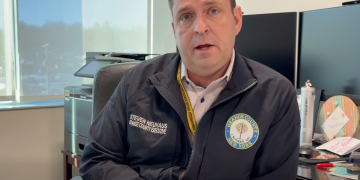
Connecticut is one of the top three “intellectual-property intensive” states in the nation, according to a March study published by the U.S. Patent & Trademark Office.
The question becomes whether the state of IP gets more intense in the coming months heading into next March.
Last September, President Obama signed the Leahy-Smith America Invents Act (AIA), widely hailed as implementing the most significant changes to the U.S. patent system in nearly 60 years.
Most notably, the new law aligns the United States with the rest of the world in awarding patents to the first person or entity to file an application, rather than relying on the previous “first to invent” system that awards rights based on the date a claimant can prove they conceived an idea they subsequently seek to patent.
The first-to-file rule does not kick in until March 2013. As of this past March, inventors get what amounts to a one-year grace period protecting them for any advanced disclosure of an invention that a rival might rush into the filing process to secure rights.
An immediate question is whether any uncertainties about the new rules might squelch collaboration between techies, which Connecticut is actively promoting via initiatives such as the Stamford Innovation Center and Startup Connecticut, among others. Scott Pierce, a University of Connecticut graduate with the Massachusetts intellectual property law firm Hamilton Brook Smith & Reynolds P.C., argues sufficient precedents are in place to protect inventors in any disputes rising from collaborations, in an article scheduled to be published in the July edition of the Journal of Patent & Trademark Office Society.
Hoping to spur more collaboration locally, The Business Council of Fairfield County revealed last week the new Center for Growth Resources, in collaboration with the Connecticut Technology Council, Connecticut Innovations, and the Connecticut Academy of Science and Engineering, among other entities.
“For an entrepreneur or rapidly growing business, the time required to break the code and identify the resources needed can in itself be a deal breaker,” Christopher Bruhl, president and CEO of the business council, said in a statement. “By providing this point of access, we can all promote and accelerate job growth in the region.”
If entrepreneurship is up, patent filings have been down since the recession. As reported by the Fairfield County Business Journal in January, last year local patent filings sunk for a third consecutive year to their lowest level since 2002, with the recession having a clear impact on those figures.
In eight months following enactment of landmark patent reform, published filings from Connecticut inventors are down nearly 75 percent from the year before. Those figures are preliminary, however, and will escalate as the U.S. Patent and Trademark Office publishes additional applications in the coming months received since September 2011.
Not until the second half of 2014 will data begin to emerge on patent filing activity after first-to-file kicks into gear next March.
“Countless inventions that can spark new businesses are right there sitting in our backlog of unexamined patent applications,” admitted USPTO Director David Kappos, speaking at two events last month. “Under the America Invents Act we”™re making tremendous progress in reducing that backlog.”
Testifying to a U.S. Senate committee last year, Kappos said he does not expect a race to the patent office with hastily drafted applications when the new rules fully kick in. He added the first-to-invent system almost never benefits the independent inventor, and that of 3 million applications filed over the previous seven years, only 25 were granted to small entities that were the second inventor to file but were able to prove they were first to invent.
















“provisions in the America Invents Act aim to spur innovation everywhere from large corporations to lab benches…”
As can now be seen the bill has had the opposite affect. Congress ignored inventors and proceeded at the country’s peril.
“patent reform”…“America Invents Actâ€
“This is not a patent reform bill†Senator Maria Cantwell (D-WA) complained, despite other democrats praising the overhaul. “This is a big corporation patent giveaway that tramples on the right of small inventors.â€
Senator Cantwell is right. Just because they call it “reform†doesn’t mean it is. The agents of banks, huge multinationals, and China are at it again trying to brain wash and bankrupt America.
They should have called the bill the America STOPS Inventing Act or ASIA, because that’s where it is sending all our jobs.
The patent bill is nothing less than another monumental federal giveaway for banks, huge multinationals, and China and an off shoring job killing nightmare for America. Even the leading patent expert in China has stated the bill will help them steal our inventions. Who are the supporters of this bill working for??
Patent reform is a fraud on America. This bill will not do what they claim it will. What it will do is help large multinational corporations maintain their monopolies by robbing and destroying their small entity and startup competitors (so it will do exactly what the large multinationals paid for) and with them the jobs they would have created. The bill will make it harder and more expensive for small firms to get and enforce their patents. Without patents we cant get funded. In this way large firms are able to play king of the hill and keep their small competitors from reaching the top as they have. Yet small entities create the lion’s share of new jobs. According to recent studies by the Kauffman Foundation and economists at the U.S. Census Bureau, “startups aren’t everything when it comes to job growth. They’re the only thing.†This bill is a wholesale destroyer of US jobs. Those wishing to help fight this bill should contact us as below.
Small entities and inventors have been given far too little voice on this bill when one considers that they rely far more heavily on the patent system than do large firms who can control their markets by their size alone. The smaller the firm, the more they rely on patents -especially startups and individual inventors. Congress tinkering with patent law while gagging inventors is like a surgeon operating before examining the patient.
Those wishing to help fight big business giveaways should contact us as below and join the fight as we are building a network of inventors and other stakeholders to lobby Congress to restore property rights for all patent owners -large and small.
Please see http://truereform.piausa.org/default.html for a different/opposing view on patent reform.
http://docs.piausa.org/